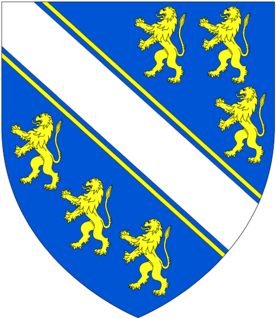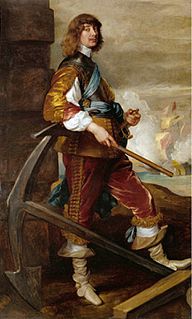 W
WField Marshal Alan Francis Brooke, 1st Viscount Alanbrooke,, was a senior officer of the British Army. He was Chief of the Imperial General Staff (CIGS), the professional head of the British Army, during the Second World War, and was promoted to field marshal on 1 January 1944. As chairman of the Chiefs of Staff Committee, Brooke was the foremost military advisor to Prime Minister Winston Churchill, and had the role of co-ordinator of the British military efforts in the Allies' victory in 1945. After retiring from the British Army, he served as Lord High Constable of England during the Coronation of Queen Elizabeth II in 1953. His war diaries attracted attention for their criticism of Churchill and for Brooke's forthright views on other leading figures of the war.
 W
WJohn Beaumont, 1st Viscount Beaumont, was an English nobleman and magnate from Folkingham, Lincolnshire. He was a councillor to King Henry VI and was rewarded for his services, becoming a leading member of the East Anglian nobility. Beaumont held numerous offices for the crown, and was promoted up the peerage to become the first man with the rank of viscount. He also amassed immense personal wealth, acquired through inheritance, marriage, and royal patronage.
 W
WJohn Russell, 4th Duke of Bedford, was an 18th-century British statesman. Bedford was leading Whig political figure around the time of the Seven Years' War, and negotiated the Treaty of Paris which ended the conflict in 1763. He was also an early promoter of cricket and a patron of the arts who commissioned many works from artists, most notably Canaletto.
 W
WEdward Stafford, 3rd Duke of Buckingham was an English nobleman. He was the son of Henry Stafford, 2nd Duke of Buckingham, and Katherine Woodville, and nephew of Elizabeth Woodville and King Edward IV. Thus Edward Stafford was a first cousin once removed of King Henry VIII. He was convicted of treason and executed on 17 May 1521.
 W
WGeorge Villiers, 1st Duke of Buckingham, KG (; 28 August 1592 – 23 August 1628), was an English courtier, statesman, and patron of the arts. He was a favourite and possibly also a lover of King James I of England. Buckingham remained at the height of royal favour for the first three years of the reign of James's son, King Charles I, until a disgruntled army officer assassinated him.
 W
WHenry Stafford, 2nd Duke of Buckingham, KG was an English nobleman known as the namesake of Buckingham's rebellion, a failed but significant collection of uprisings in England and parts of Wales against Richard III of England in October 1483. He is also one of the primary suspects in the disappearance of his nephews, the Princes in the Tower.
 W
WRobert Offley Ashburton Crewe-Milnes, 1st Marquess of Crewe,, known as The Lord Houghton from 1885 to 1895 and as The Earl of Crewe from 1895 to 1911, was a British Liberal politician, statesman and writer.
 W
WThomas Stanley, 1st Earl of Derby, KG was an English nobleman. He was stepfather of King Henry VII of England. He was the eldest son of Thomas Stanley, 1st Baron Stanley and Joan Goushill.
 W
WHenry of Essex or Henry de Essex was an Anglo-Norman nobleman who was feudal baron of Rayleigh in Essex and of Haughley in Suffolk. He served as one of the royal constables during the reigns of Kings Stephen and Henry II by right of his second wife, which office included the duty of bearing the royal standard to indicate the location of the king when on campaign or in battle. In 1163 he was convicted as a traitor, having been defeated in trial by battle, and took the habit of a monk, spending his last years at Reading Abbey.
 W
WAlexander William George Duff, 1st Duke of Fife, styled Viscount Macduff between 1857 and 1879 and known as The Earl Fife between 1879 and 1889, was a Scottish peer who married Princess Louise, the third child and eldest daughter of King Edward VII and Queen Alexandra.
 W
WThomas of Woodstock, 1st Duke of Gloucester was the fifth surviving son and youngest child of King Edward III of England and Philippa of Hainault.
 W
WHenry FitzRoy, 1st Duke of Grafton, was an illegitimate son of King Charles II of England and his mistress Barbara Villiers. A military commander, Henry FitzRoy was appointed colonel of the Grenadier Guards in 1681 and Vice-Admiral of England from 1682 to 1689. He was killed in the storming of Cork during the Williamite–Jacobite War in 1690.
 W
WHenry de Bohun, 1st Earl of Hereford of Pleshy Castle in Essex, was an Anglo-Norman nobleman who became Hereditary Constable of England from 1199.
 W
WJohn de Mowbray, 2nd Duke of Norfolk, 8th Baron Mowbray, 9th Baron Segrave KG, Earl Marshal was an English nobleman and soldier. He was a younger son of the first Duke of Norfolk and Lady Elizabeth Fitzalan, but inherited his father's earldom of Norfolk when his elder brother rebelled against King Henry IV and was executed before reaching the age of inheritance. This and the fact that his mother lived to an old age and held a third of his estates in dower, meant that until the last few years of his life he was, although an important political figure, poorly-off financially.
 W
WAlgernon Percy, 10th Earl of Northumberland, 4th Baron Percy, KG was an English aristocrat, and supporter of the Parliamentary cause in the First English Civil War.
 W
WJames FitzJames Butler, 2nd Duke of Ormonde, (1665–1745) was an Irish statesman and soldier. He was the third of the Kilcash branch of the family to inherit the earldom of Ormond. Like his grandfather, the 1st Duke, he was raised as a Protestant, unlike his extended family who held to Roman Catholicism. He served in the campaign to put down the Monmouth Rebellion, in the Williamite War in Ireland, in the Nine Years' War and in the War of the Spanish Succession but was accused of treason and went into exile after the Jacobite rising of 1715.
 W
WHenry Grey, 1st Duke of Suffolk, 3rd Marquess of Dorset, was an English courtier and nobleman of the Tudor period. He was the father of Lady Jane Grey, known as "the Nine Days' Queen".
 W
WArthur Wellesley, 1st Duke of Wellington, was an Anglo-Irish soldier and Tory statesman who was one of the leading military and political figures of 19th-century Britain, serving twice as prime minister. He is one of the commanders who won and ended the Napoleonic Wars when the coalition defeated Napoleon at the Battle of Waterloo in 1815.
 W
WEdward Somerset, 4th Earl of Worcester, KG, Earl Marshal was an English aristocrat. He was an important advisor to King James I, serving as Lord Privy Seal.